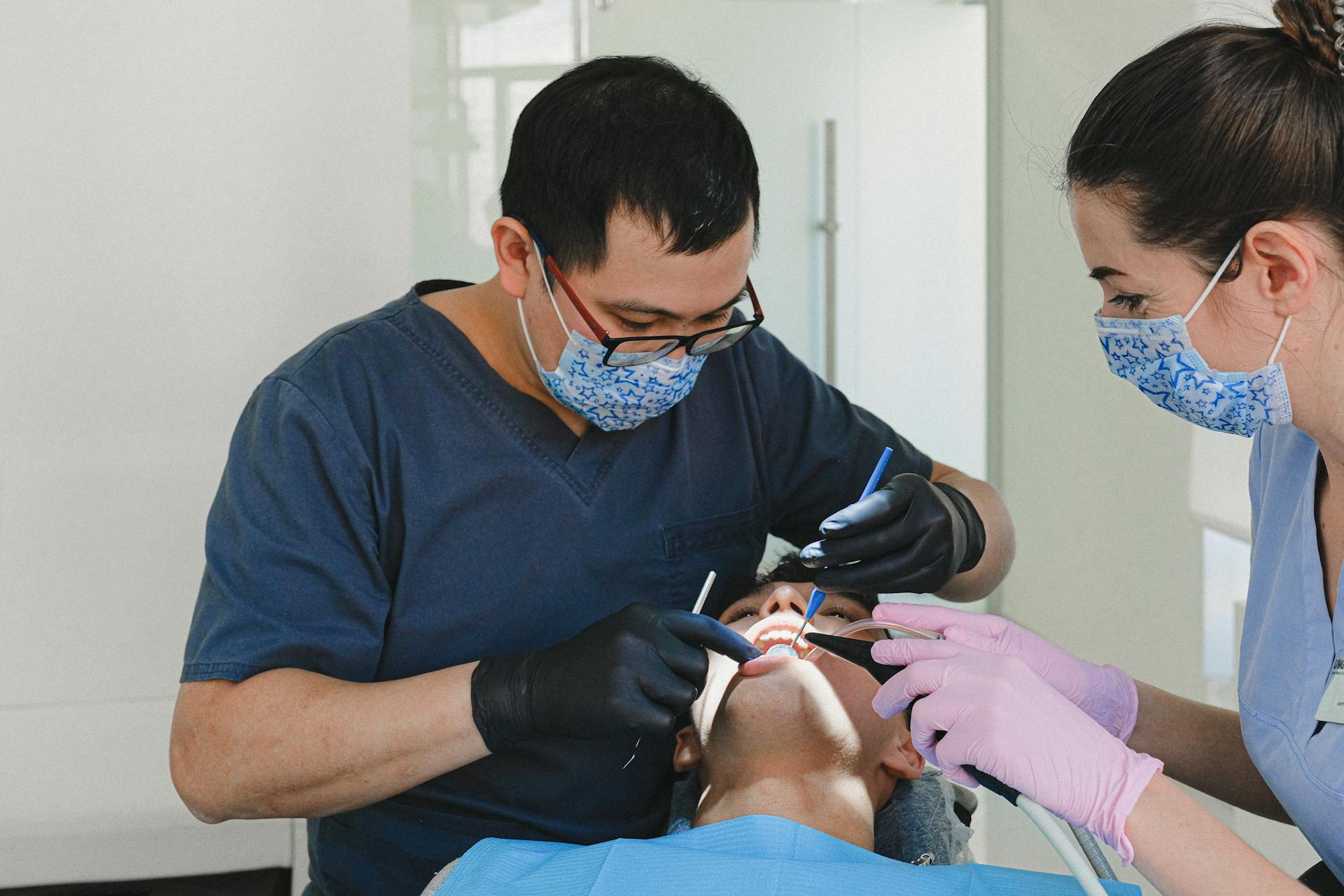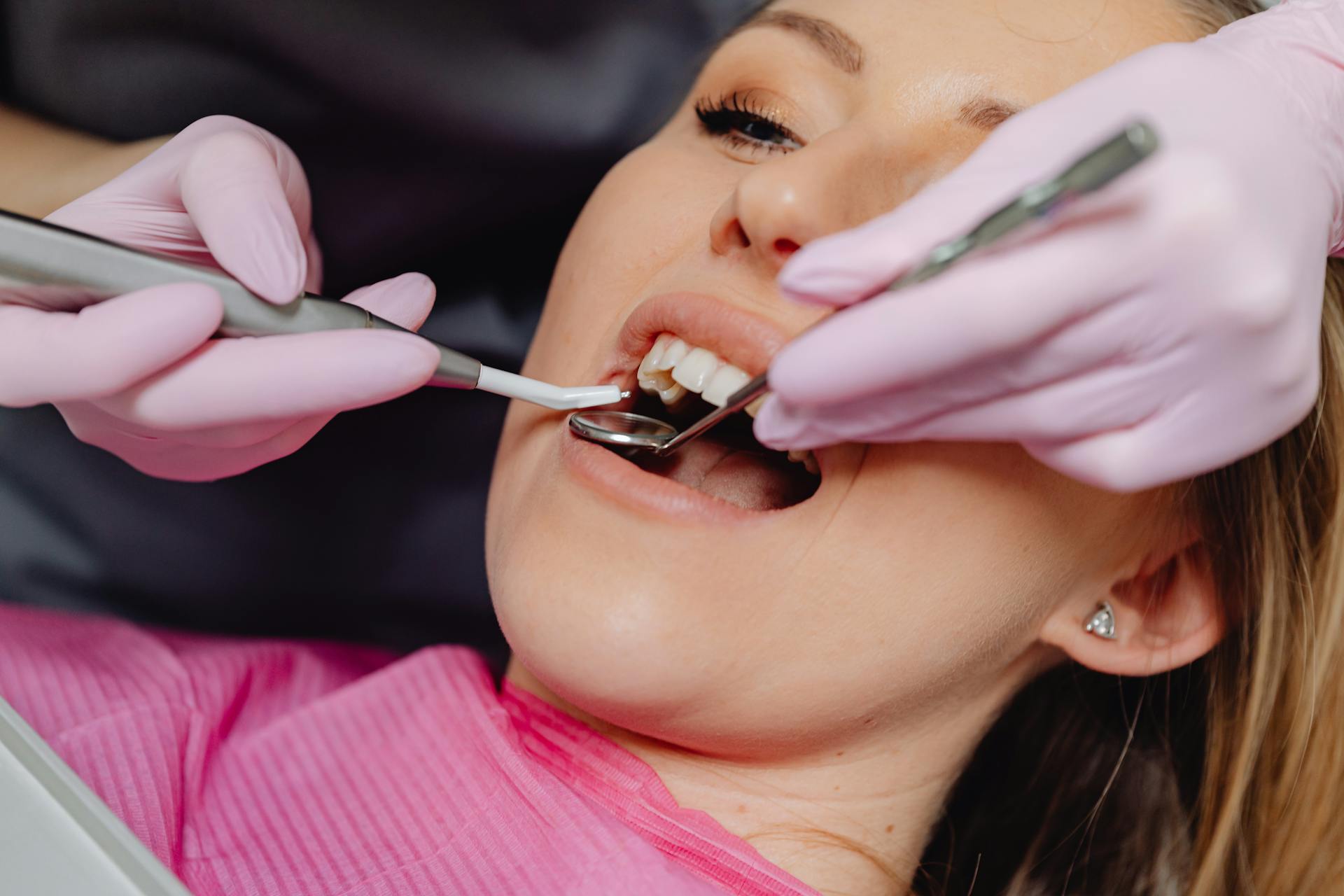
Dental disability insurance is a type of insurance that provides financial protection in the event of a dental career-ending injury or illness.
It's essential to understand what constitutes a disability in the dental field, as this will determine the payout. A dental disability is typically defined as an injury or illness that prevents a dentist from performing their duties, such as a hand injury that makes it difficult to perform surgery.
Dental disability insurance can be purchased separately or as part of a larger insurance package. The cost of the insurance varies depending on factors such as age, health, and profession.
Types of Coverage
Dental professionals have three main types of disability insurance to consider: Individual, Group, and GSI Disability Insurance.
Individual Disability Insurance is purchased directly from an insurance company, allowing you to keep coverage even if you change employers. However, you may have to go through a medical review to get this type of coverage.
For more insights, see: Always Care Individual Dental Insurance

Group Disability Insurance is often provided as an employee benefit, with employers covering a portion of the cost, making it more affordable. However, you lose coverage if you change jobs.
GSI Disability Insurance is guaranteed without medical underwriting and is intended to offer portable coverage if you change jobs. It's best to check with a vetted insurance agent to find options that are right for you.
Here are the key differences between these types of coverage:
Difference Between GSI, Individual, and Group Coverage
Dental professionals have several options when it comes to disability insurance, and understanding the differences between them is key to making an informed decision.
Individual disability insurance is purchased directly from an insurance company, but may require a medical review, which can impact the price.
Group disability insurance is often provided by an employer and can be more affordable due to shared costs, but coverage is typically lost if you change jobs.
GSI disability insurance is guaranteed without medical underwriting and offers portable coverage, but may be harder to find, especially for dentists.
Here's a quick comparison of the three types of coverage:
Keep in mind that GSI disability insurance for dentists may be hard to come by, so it's best to check with a vetted insurance agent for options.
Riders to Add
You'll want to consider adding certain riders to your disability insurance policy. These riders can provide additional protection and benefits to ensure you're covered in case of a disability.
One key rider to consider is the Own Occupation rider. This rider states that if you become disabled and can no longer practice dentistry, you can still receive your benefit payment even if you take on another job.
The Partial Disability rider is also important. This rider can help you make up the difference in income if you're still able to work, but at a reduced capacity. For example, if you can only see 30 patients a day instead of your normal 50.
You may also want to consider the Future Insurability / Future Purchase Options rider. This rider allows you to purchase more insurance in the future, without having to show physical justification.
The Cost of Living Adjustment rider can also be beneficial. This rider will increase your annual benefit based on the Consumer Price Index, ensuring that your benefit keeps pace with inflation.
Here are some key riders to consider adding to your policy:
- Own Occupation rider: ensures benefit payment even if you take on another job
- Partial Disability rider: helps make up the difference in income if you're working at a reduced capacity
- Future Insurability / Future Purchase Options rider: allows you to purchase more insurance in the future
- Cost of Living Adjustment rider: increases your annual benefit based on the Consumer Price Index
Cost and Coverage
Disability insurance for dentists can be expensive, but the cost is worth it for the peace of mind it provides. You can expect to pay between 1% to 3% of your annual income, which translates to $84 to $173 per month or more.
Age is a significant factor in determining premiums, with older dentists paying more. Your health also plays a role, as those with fewer medical issues will pay lower premiums.
Smoking and engaging in risky activities like scuba diving or auto racing can increase your premiums. The definition of disability, waiting period, benefit length, income/benefit amount, and extra features all impact the cost of your policy.
Take a look at this: With Disability Income Insurance an Insurance Company May Limit
You'll pay more for riders, which are added features to enhance your policy. For example, ADA disability insurance for dentists costs between $46.91-$354.46 per month for plans with a 90-day waiting period.
To determine how much disability insurance coverage you need, consider your income, expenses, and savings. A common reference point is that investors can take 4% of their investment account value out annually and never run out of money.
You'll need to cover the remainder of your living expenses with income, and that number could be considered a minimum for long-term disability insurance.
Here's a rough estimate of the monthly cost of disability insurance for dentists, based on income:
Keep in mind that these are rough estimates and your actual premium amount will depend on several factors, including your age, health, and lifestyle.
Policy Details
Disability insurance policies for dentists come in different forms, but many experts recommend long-term policies with an own-occupation definition of disability.
This provision ensures that if you're unable to practice dentistry due to illness or injury, you'll still receive benefits, even if you can do other work. For example, if you're a dentist who can't work in your regular occupation but is willing to take a teaching or consulting job, you can get your full benefit payment.
Some insurance companies offer variations on this definition, such as True Own-Occupation, Modified Own-Occupation, Hybrid 1: Two-Year True Own-Occupation, and Hybrid 2: Two-Year Modified Own-Occupation.
Here are some key differences between these definitions:
Policy Details
Disability insurance policies can be tailored to fit individual needs, but understanding the details is crucial.
Short-term disability coverage typically offers payments for a term of 3-6 months, and there may be a waiting period before coverage begins. For example, you could get coverage for three months after a one-month waiting period.
The amount of income replacement varies between policies, but short-term disability usually covers a significant percentage of your income, perhaps up to 70%. This means that for every dollar you earn, you could receive up to 70 cents in benefits.
You might enjoy: Dental Insurance Virginia No Waiting Period
Long-term disability coverage typically requires a longer waiting period and offers much longer payment periods. You could have a plan covering five years, 10 years, 20 years, or longer.
Long-term disability often pays 40%-70% of your income, which can be a significant relief for those who rely on their income to support themselves and their families. This is especially important for dentists and other covered individuals who may have significant expenses and financial commitments.
Expand your knowledge: Dental Insurance Plans Long Island
What Policy is Best?
So, you're looking for the best disability insurance policy for dentists. Many professionals would advise you to limit your search to long-term policies with an own-occupation definition of disability.
This provision provides a much more comprehensive level of financial protection compared to any-occupation plans. Own-occupation coverage pays benefits even if you can't practice your own occupation, but can do some other type of work.
Guardian offers different forms of own-occupation coverage to tailor benefits to your needs. For example, their True Own-Occupation definition means you can get your full benefit payment even while holding another kind of job.
See what others are reading: Dual Dental Insurance Coverage for Orthodontics

Modified Own-Occupation definition pays a full benefit if you can't work in your regular occupation and you are not gainfully employed in another capacity. This means you'll receive benefits as long as you're not earning income.
Hybrid policies offer a combination of True and Modified Own-Occupation definitions. For instance, the Two-Year True Own-Occupation definition offers a two-year period of True Own-Occupation, after which your coverage converts to a Modified Own-Occupation definition.
Here are the different forms of own-occupation coverage offered by Guardian:
- True Own-Occupation: pays full benefit while holding another job
- Modified Own-Occupation: pays full benefit if not gainfully employed in another capacity
- Hybrid 1: Two-Year True Own-Occupation: offers two-year period of True Own-Occupation, then converts to Modified Own-Occupation
- Hybrid 2: Two-Year Modified Own-Occupation: offers Modified Own-Occupation for the first two years, then converts to Any-Occupation definition
How It Defines "Occupation"
An "own occupation" disability insurance policy is the best option for dentists, as it provides full disability benefits as long as you cannot perform the substantial duties of your specific job at the time you became disabled. This is a crucial distinction, as it ensures you receive benefits even if you can work in another capacity.
For example, Guardian offers a "True Own-Occupation" definition, which means you can take a teaching or consulting job and still receive replacement income for the entire benefit period. This is a game-changer for dentists who may need to transition to a different role due to an illness or injury.

However, not all own occupation plans are created equal. Some plans may transition from an "own occupation" policy to a more rigorous standard after a few years, which could terminate your benefit payments. To avoid this, look for policies that allow you to work in fields outside of dentistry without terminating benefits.
A key factor to consider is the definition of your occupation. A narrowly defined occupation can provide more comprehensive coverage, whereas a broader definition may leave you vulnerable to benefit termination. For instance, if your policy defines your occupation as "dentist", you may be able to continue working in a related field without affecting your benefits.
Here are some key differences between own occupation and any occupation policies:
- Own Occupation: Benefits if you can't perform the duties of your specific job
- Any Occupation: Benefits if you can't perform any occupation to which you are "reasonably suited"
Ultimately, it's essential to carefully review the fine print and understand how your policy defines "occupation" to ensure you receive the benefits you need in the event of a disability.
Benefits and Worth
Disability insurance can replace 60-80% of your after-tax income if you're totally disabled and unable to work due to a lasting illness or injury.
For dentists, this can be a lifesaver, as their ability to earn an income is dependent on their physical health and manual dexterity.
A long-term disability insurance policy can pay you between 60-80% of your gross income for the length of your benefit period, which can be as short as two years or go all the way to retirement.
This can help ensure that you can meet your living expenses and other financial obligations, even if you're unable to practice dentistry.
The cost of a comprehensive disability insurance policy is typically between 1% and 3% of your annual income, which can be around $84 to $173 per month for a dentist.
For dentists who don't have enough savings to maintain their lifestyle in the event of a disability, disability insurance is usually worth it.
Frequently Asked Questions
What is considered a dental disability?
A dental disability is considered a condition that affects a person's ability to eat, grow, or participate in daily activities due to orofacial pain, infection, or other issues. This can include problems with tooth decay, gum disease, or missing teeth that impact overall health and well-being.
Sources
- https://www.guardianlife.com/disability-insurance/dentist
- https://www.whitecoatinvestor.com/dentist-disability-insurance/
- https://bryantlg.com/blog/long-term-disability-dentists-should-take-a-proactive-approach/
- https://drdisabilityquotes.com/disability-insurance/dentists/
- https://ignitedds.com/2024/02/dentist-disability-insurance/
Featured Images: pexels.com

